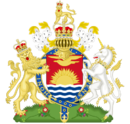Prime Minister of Kiribati-Tarawa
| Prime Minister of the United Kingdom of Kiribati and Tarawa | |
|---|---|
 Royal coat of arms used by His Majesty's Government | |
| Style |
Prime Minister (informal) The Right Honourable (formal) |
| Member of |
|
| Reports to | Parliament |
| Residence |
|
| Seat | Westminster |
| Appointer | The Sovereign |
| Term length | At His Majesty's Pleasure |
| Inaugural holder |
The Earl of Huntingdon as First Lord of the Treasury |
| Salary |
ƒ260,000 annual, including ƒ100,000 MP's salary |
The Prime Minister of Kiribati-Tarawa is the head and chief executive of His Majesty's Government in Kiribati-Tarawa. The Prime Minister and the Cabinet are collectively responsible for all actions taken and all policies implemented to the monarch, Parliament, their political party, and the electorate. The current holder is Catherine Willoughby, who was appointed by the King on 19 January 2014.
Although the office is not formally established by any statute or constitutional document, convention stipulates that the monarch shall appoint as Prime Minister the individual best able to command the confidence of the House of Commons; in modern times, this has always been the leader of the majority party in the House of Commons, or the senior party in a coalition of confidence and supply agreement.
The powers of the Prime Minister and the Cabinet stem from two sources: their command of the House of Commons to pass legislation, and their exercise of the monarch's royal prerogative to take executive actions. In this way, the Prime Minister and Cabinet exercise their authority in the sovereign's name, and the Government is thus accountable first and foremost to the sovereign.
Authority
Legislative role
As the head of the Government, the Prime Minister endorses all legislation introduced by the Government to the House of Commons.
Executive role
The most significant executive role of the Prime Minister is in the formation of the Cabinet; the Prime Minister selects all members of the Cabinet, who in turn select junior ministers in their departments, and may also dismiss ministers. As such, the Prime Minister has a tremendous amount of influence over the Government and in determining the direction of Government policy.
The Prime Minister is the chief executive and head of the Government, but within the Government acts as primus inter pares. All decisions taken by the Cabinet are discussed in confidential meetings and voted on by the Cabinet. All members of the Cabinet are collectively responsible the policies and actions of the Government, and those members who are unwilling to be are expected to resign.

